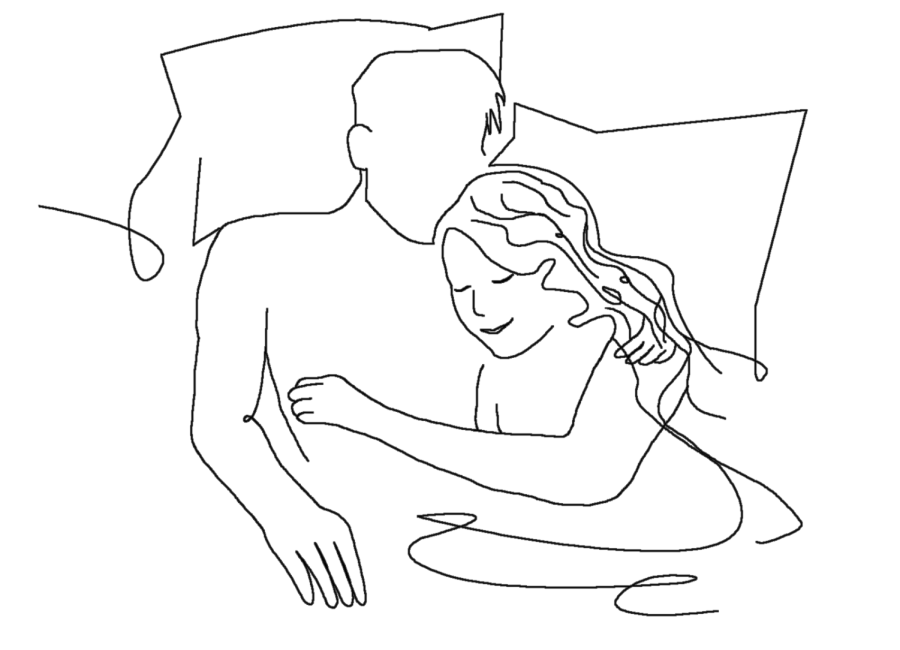No strings attached: college hookup culture
What was once taboo is becoming more acceptable in college environments
March 1, 2022
Within the realm of 8 a.m. classes, lecture halls and dorm rooms, one-night stands seem to be part of our modern college experience. As a result of shifting ideals, that weekend morning walk of shame after a night out is no longer considered so shameful.
Hookup culture is not new. In fact, uncommitted, premarital sexual relations started to become more prevalent around the 1920s, when interactions between adolescents began taking place in the world of automobiles and movie theaters, away from the prying eyes of parents. Later on, in the 1960s, this became further popularized due to a handful of factors like the public call for sexual liberation, feminist movements and more reliable access to contraceptives.
“I think hookup culture has always been a thing, especially in college settings,” says UTSA sociology professor Favor Campbell. “I went to college as a freshman in 1998 and it was happening and people knew about it. It’s just that now, people are more vocal and open about it than maybe 20 years ago. I do think it’s still limited to younger generations….I’ll say late teens to maybe 20-somethings. I think older generations may not participate in this quite as often and if so, they are not as quick to share this information since it was seen as taboo for them before.”
Hookup culture seems to have become more normalized in today’s day and age, especially within the scope of college campuses. Like many other societal shifts, this can be attributed to the internet and media. As a result of the internet, there has been somewhat of an ideological shift into a society that is more sex-positive in an attempt to spread reproductive awareness and education on how to have safe, consensual and mutually enjoyable sex. This unabashed access to information has made the subject of sex much less taboo. This access to more education and convenient — often free — contraceptives also allows for non-committed, non-monogamous sex to be less of a risky activity, as opposed to previous decades in which sleeping with someone might signify starting a family with them. Additionally, by placing pleasure at the forefront of sexual decisions, individuals are allowed the choice to have sex when they want to, rather than when they “should.”
Furthermore, the casual and frequent portrayal of sex in media such as movies, TV shows and music makes the subject not only less taboo, but also an expected staple of the adolescent experience, given that a considerable amount of media focuses on young adults in college, high school and at times even middle school.
“Even from a non-sociological perspective, media has changed society’s perception of sex,” Campbell explains. “If we look at what was considered rated R back in the 1990’s, it is now often PG-13. Lyrics of music are more overtly sexual and it’s easier to see sexualized ads in several media forms. All of this normalizes what was once taboo.”
This is also facilitated by social media such as dating apps, where people can skip the pain-staking process of getting acquainted with someone, and shamelessly state what type of exchange they would like, whether it’s a long-term relationship or a one-night stand. Through apps like Tinder and Bumble, people can cycle through an expansive list of ideal candidates and control the level of commitment they would like to have, as well as how quick they want this interaction to move.
“There’s no denying the accessibility that dating apps provide when individuals often understand that this is a space where hookups are acceptable and often take place…it’s much easier to find and approach someone as opposed to decades ago.”
This modifies sex into an interaction in which needs are met however is simplest, most instantly gratifying and least emotionally expensive.
“From a sociological perspective,” Professor Campbell says, “hookup culture definitely can be viewed from a functionalist perspective and even exchange theory. We live in a time where individuals are more confident in their sexuality. They don’t necessarily see it as wrong or taboo if they want to engage in a sexual activity to get a need met.”
Without a doubt, there are positive effects that have stemmed from this shift towards sex in our culture. For one, people are more free to learn more about themselves and their identities through sex. They have the opportunity to explore their sexual orientations and what they desire within a sexual interaction without the pressure and consequences of having to commit to it long-term. This leads to a greater sense of identity, confidence and autonomy.
Furthermore, the more normalized sex is through hookups, the more it becomes part of the societal conversation. With this normalization, more education is not only readily available, but also colloquially known. This education within popular cultural discourse and the media, especially when regarding non-heterosexual sex, STD’s and pleasure and consent, is crucial considering many schools do not widely spread this information through their sex education programs. This may lead to many feeling alone and ashamed from their experiences, doubtful about their health and what’s considered normal or abnormal and participating in unsafe and unhealthy practices through sex.
On the other hand, there are also dangers that come with a more sexually active society. While education should help prevent this, more sex does mean a higher risk of STD and STI transmission. Furthermore, there is a greater risk of instances of rape and sexual assault, especially when substances like drugs and alcohol come into play.
Some worry that this instant access to the satisfaction of sexual exchanges without the emotional duty will eventually degrade the traditional ideal of romance, intimacy, commitment and vulnerability within later long-term relationships. Furthermore, hookups can create situations in which women are further sexualized, objectified and exploited. Many women are also shamed and labeled for their promiscuity, while men are praised and celebrated for the same behavior.
“From a conflict perspective, I would examine safety concerns for all people involved,” Campbell says. “Not only regarding STDs but also violence and potential stalking issues if a person decides they don’t want it to just be a hookup.”
Furthermore, Campbell adds, “ I have to acknowledge from a sociological standpoint that double standards still exist. Unfortunately, women — especially in heterosexual relationships — are often still judged harsher than men.”
Whichever way you choose to look at it, hookup culture is a prevalent reality in which we live, especially as young college students.
“Age wise, this is a time where many individuals are coming more into themselves sexually. Throw in living among others who share the same beliefs regarding sexuality and are willing participants, you’ve created a perfect opportunity.”











Eric Franklin • Mar 3, 2022 at 3:34 pm
Once again, a very well written and interesting article from Ms. Llano. I largely agree with the impacts of detaching emotions from sex. Sex is still a very powerful thing. Whether people choose to allow it to have power over them or not, it still matters. People should not be ashamed if they find someone sexually attractive and want to hook up with them. However, it is very easy with today’s culture to lose the true meaning of intimacy and attraction. In sum, do what you would like, and don’t let anyone tell you it’s wrong, but you must be aware of the consequences. Both emotionally and physically.